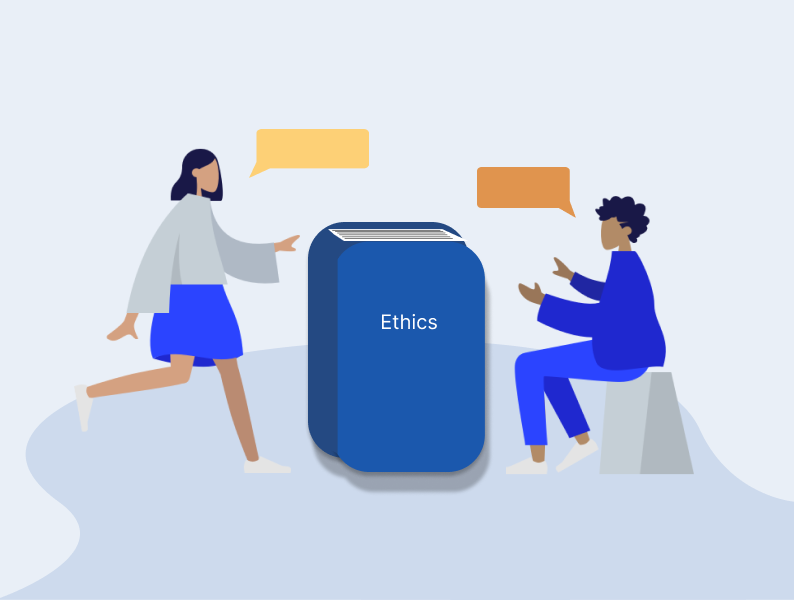When starting a career in technical communication, most people regularly plan for and consciously consider items such as paid time off, salary offers, and opportunities for promotions. In recent years, company culture has become another significant factor which demonstrates a company’s prioritization of a much larger corporate value– ethics.
Ethics can be easily dismissed by individuals and companies that assume they know ‘right’ from ‘wrong’, but ethics– just like any other field of study– includes a deeper level of consciousness. To help provide clarity on how ethics can be consciously incorporated into one’s profession, this article will review three instances in which ethics should be considered: within one’s industry, within one’s profession, and within one’s personal values.
Business Ethics
For the purpose of this article, business-based ethics are principles that guide employees within a work environment or company. Ethics are necessary in helping businesses prevent an unfair or toxic work environment and, in more extreme cases, to protect a company from future lawsuits. For instance, larger corporations tend to prevent employees from accepting expensive or luxurious gifts from clients as it could lead to favoritism or be viewed as a bribe. Guidelines for situations such as giving or receiving gifts are commonly documented in resources like a company’s code of conduct book, an employee handbook, or a policies and regulations booklet.
Companies document and develop training for various ethical situations or concerns to educate their employees on appropriate ethical responses and to familiarize their staff with the points of contact for different matters. When researching a company you would like to join, check to see if they have posted any of these employee resources online. If you can access these resources, consider reviewing them and asking yourself the questions listed below.
- Are the resources up to date?
- Do the resources include points of contact?
- Do the resources discuss how to respond accordingly in unfamiliar situations?
- Do the company’s resources adequately discuss ethics in the workplace?
Asking questions can help you determine a potential employer’s commitment to ethics, or how well a potential employer’s ethical values align with your own. Conducting research before an interview can help you determine if this company is somewhere you would like to work. If you are unsure based on your research, consider asking questions about their commitment to ethics or company culture during your interview.
Profession-Based Ethics
Unlike the guiding policies and regulations that often govern individuals in the workplace, profession-based ethics are more specific to one’s job title. For example, the Society of Technical Communication (STC) is a community that offers resources and a networking space to its members. A core aspect of maintaining membership and benefitting from the organization’s opportunities is committing to the STC’s ethical principles of Legality, Honesty, Confidentiality, Quality, Fairness, and Professionalism. The Association of Teachers of Technical Writing (ATTW) is also a profession-based organization that clearly outlines the ethical responsibilities of their members. A code of ethics or oath is common within professional communities, since each functions as a method of responsibility and accountability assurance.
Joining communities such as the STC or the ATTW is not a requirement to work within technical communication, but these networks can help guide your actions and provide extra resources on the topic of ethics. A professional network offers many benefits, such as safe space for working through ethical dilemmas that may have been encountered within your workplace. In new and unfamiliar situations, the ethical decision can feel very unclear. However, having a professional network to consult prevents you from feeling alone.
Personal Ethics
Personal ethics are simply your own pre-developed ethical boundaries. Knowing your own ethical boundaries or obligations is crucial as your guiding principles will allow you to make healthy commitments, feel confident in your own decisions, and better support the companies that align with your values.
One personal boundary you might set that could influence your professional decision-making process may include the protection of others’ private information. If your boss insists on knowing about a private conversation between you and a co-worker, establishing a boundary on the release of shared personal information provides you the necessary confidence to deny further elaboration. Your discussion may include emphasizing that your conversation was private or addressing the specific concerns that your boss may hold. Regardless, knowing your personal needs and boundaries helps foster better relationships and helps you evaluate your company’s ethical commitments.
Being conscious of your own code of ethics empowers you to ask questions and to seek advice. Ultimately, individuals who consider ethics within their decision-making process are more likely to resolve feelings of discomfort by familiarizing themselves with the resources within their workplace or trusted professional communities.
Ethics in Action
Personal ethics is our foundational belief system that inevitably guides our professional and industry based decisions. Within one’s career, a personal ethics statement is a tool that technical communicators can use to convey their values and how these principles are displayed in the various aspects of their life. The half page statement is a wonderful document you can use to share how your personal experiences have shaped your core values. Once you have developed your personal ethics statement, share it on your LinkedIn, add it to your writing portfolio, or bring it to your next job interview to demonstrate your ethical commitments.
Did you develop a personal ethics statement? Share it on LinkedIn and tag Master TCLoc or comment your experience on our LinkedIn post!



